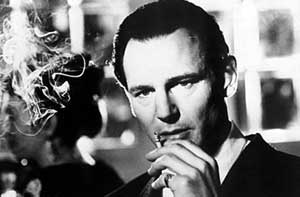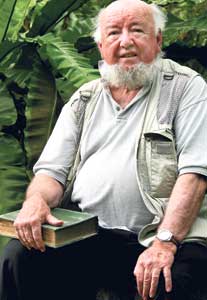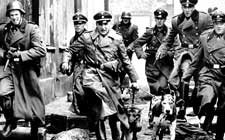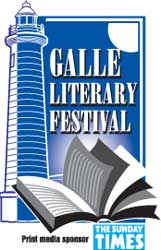| His full white beard, and kindly eyes might still invite you to confession, but Thomas Keneally stepped off the road to priesthood many decades ago. Instead of becoming ordained, Mr. Keneally has spent nearly five decades establishing himself as one of Australia’s most beloved and prolific novelists and has seen his work win no less than the holy of holies – the 1982 Booker Prize with his novel ‘Schindler’s List’.
Today he continues to publish a book almost every other year, on subjects as diverse as Joan of Arc, Arctic explorers and the Irish Famine, even as he has settled down into the many pleasures of being a grandfather.
He is delightful in person. Prone to sudden guffaws, Mr. Keneally is perhaps unsurprisingly, an incorrigible and accomplished story teller, with a voracious appetite for history and a compassionate, questioning mind. And he never misses an opportunity to make you laugh.
Looking back, he remembers leaving St. Patrick’s Seminary in the ’60s, still unsure of what he could do to earn a living. The young Keneally would take on all sorts of odd jobs, including a memorable stint as an insurance collector. Fortunately, he seems to have never regretted his choice. “I would have made a rotten priest – not because I was interested in altar boys – but because I was rebellious in a quiet sort of way, in a way that slowly drove me mad,” he says.
But it was never taken for granted that he would become a professional writer. To him, Australia was not at that time a place that nurtured novelists. “We were full of cultural inferiority...our population was made up of economic refugees from the British Isles and I thought our business was participating in foreign wars, playing cricket and growing fine wool, not in writing novels.”
If he then had no one to guide him, equally he had no one to tell him that he could not make a living as a writer. And make a living he did. Over the course of 30 novels, nearly 15 non-fiction books and four plays Mr. Keneally has earned a reputation for endowing his characters with depth and complexity and for setting them in tumultuous, demanding environments. He is rarely, if ever, didactic but as a man seemingly unafraid of shadows, he has time and again shed light onto moments in our history where humanity has seemed to fail itself.
 |
| Liam Neeson as Oskar Schindler in the film version of the book |
“I have always been fascinated by how history changes the direction of people’s lives – often so unjustly,” he says ruminatively. The heroism that is always visible in such moments is his particular interest. In fact, his two most recent publications, ‘A Widow and her Hero’ (2007) and ‘Searching for Schindler: A Memoir’ (2007) both grapple explicitly with what it means to be a hero. ‘A Widow and her Hero,’ is about an Australian woman named Grace who must come to terms with her husband, Captain Leo Waterhouse’s gruesome execution at the hands of the Japanese during WW II. Running through the novel are excerpts from her husband’s diary.
As a young boy, Mr. Keneally himself saw WW II overtake the world. “I was a little kid at the time when the Japanese militarists were marching...they were marching through Indonesia and it seemed as if their advance would never end. And down at the end of the railway line, as far as you can get before the penguins of Antarctica, was Australia.” At that time, his countrymen felt a very real fear and antipathy towards the Japanese, even though in later years the situation would eventually reverse itself and the two countries would establish close political and cultural ties. For his character, Grace Waterhouse, this switch proves almost impossible to become accustomed too, even as she must make sense of her bereavement; and particularly of how her husband was “not so much addicted to heroism as enchanted by it.”
His other book, a non-fiction memoir, is also built around heroes, but the motives of the enigmatic Oskar Schindler have always been subject to heated debate. “You couldn’t say where opportunism ended and altruism began,” says Mr. Keneally admitting that 30 years after the book was published, he is still no closer to understanding the man who saved so many Jewish lives.
 |
| Keneally: A man well content. |
When he first wrote the book, it was as a work of ‘faction’ - “like Truman Capote’s ‘In Cold Blood’. That he had access to the story at all was thanks to a store owner named Poldek Pfefferberg. ‘Searching for Schindler,’ is in many ways Poldek’s story. “I wanted to write about him because he was a character nearly as big as Schindler,” says Mr. Keneally remembering the time he met Mr. Pfefferberg at the latter’s luggage store in Beverley Hills.
“He was an extraordinary character...he would say ‘I have looked the devil in the face twice, Hitler and Stalin, and I’m not going to take a backward step’,” says Mr. Keneally doing a very credible imitation of Mr. Pfefferberg’s heavy accent. Intent on having Oskar Schindler’s story told to the world, Mr. Pfefferberg had made a habit of cornering any unsuspecting customer who might be able to turn the story into a book or a movie. “He was always convinced it was a great story. I didn’t believe him, publishers didn’t believe him, Universal Pictures didn’t believe him and Stephen Spielberg didn’t believe him. But he would say: ‘Stephen, make this film, don’t make films about little furry animals, you can’t win Academy Awards with little furry animals. Make a great story of humanity - man to man. And you’ll get an Oscar for Oskar’...that was his war cry.”
Presciently, Mr. Pfefferberg predicted great success for both the novel and the movie, and both went on to collect some of the most recognized accolades in their respective industries, including seven Academy Awards for the latter, among which were counted awards for the Best Picture and Best Director. Though the movie was not entirely faithful to the novel, Mr. Keneally is philosophical about it: “The filmmakers have the elbow room in the limousines, but us novelists have the elbow room in our books.”
Over thirty years since Schindler’s List (initially released under the title Schindler’s Ark) was published, Mr. Keneally, now in his seventies, shows absolutely no signs of slowing down. When we met him, he was carefully proof reading the manuscript of his latest work, a book that compares and analyses the great famines of the world. “It’s very appropriate for a tubby man, like me,” he says patting his full belly. He is also working on another novel that involves the Russian revolution. The going is not always easy, and he admits frankly to sometimes struggling with depression. “You start off with the divine illusion that the world needs this book...and then you get about halfway through, and you realise it’s just another book. You’re like a juggler who has put all these coloured balls up into the air and you doubt you can catch them all.”
 |
| Two stills from the Oscar-winning movie ‘Schindler’s List’. Courtesy ncowie. wordpress.com and moviewallpaper.net |
But the passing years have lessened the intensity of such mid-book crises, even as they have strengthened his technique. “By now I think that the world doesn’t need my books, I’m the only one that needs them.”
It’s been a long and illustrious career, one that began with the publication of ‘Place at Whitton’ in 1964 by a very young, very uncertain author. Does he recognize anything of himself in that boy? “Sometimes, until I look in the mirror, I think I’m him,” he says thoughtfully. “You carry your childhood with you, for your entire life, and you revert to it, revert to the feelings of loneliness, rejection but also to that pure joy.” He pauses, hunting until he finds some heavily creased photographs to show me. “Your grandchildren, they return you to that pure joy,” he says, obviously a man well content.
|




